| Srl | Item |
| 1 |
ID:
134116
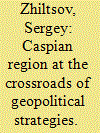

|
|
|
|
|
| Publication |
2014.
|
| Summary/Abstract |
The author concentrates on the geopolitical games in the Caspian region and identifies the factors that have remained prominent in the last twenty years and, in fact, determined the developments in this part of the world, viz. oil and gas reserves, the scope of their industrial production, and the recently built export pipelines as geopolitical instruments of the Caspian states and extra-regional players.
He analyzes the geopolitical aims of Russia, the European Union, the U.S., and China, the key players responsible for the Caspian geopolitical context, to conclude that the region's geopolitical, social, economic, and political future, as well as its interstate relations largely depend on the pace at which oil and gas is produced and pipeline projects implemented
|
|
|
|
|
|
|
|
|
|
|
|
|
|
|
|
| 2 |
ID:
129254


|
|
|
| 3 |
ID:
122811
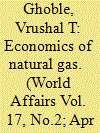

|
|
|
| 4 |
ID:
108043


|
|
|
|
|
| Publication |
2011.
|
| Summary/Abstract |
The geographic proximity of Central Asia to Russia, China, the Caucasus and the Caspian region, as well as to the Middle East, makes this oil and gas-producing region a crucial and ever-developing player in regional and global energy markets. The method by which Central Asian producers choose to develop their hydrocarbon resources and export infrastructure will have significant implications for the plans for diversification of oil and gas supplies of Europe, China and India, as well as for Russia's energy exports to Europe. It is still too early to tell whether the economic and political incentives are strong enough to promote cooperation between the various actors or whether the energy interests of these key external powers are so diverse as to clash in Central Asia.
|
|
|
|
|
|
|
|
|
|
|
|
|
|
|
|
| 5 |
ID:
143210
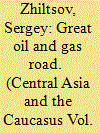

|
|
|
|
|
| Summary/Abstract |
The geopolitical changes associated with the collapse of the Soviet Union and the emergence of the newly independent states in its territory have led to the appearance of a large number of new pipeline projects. Some of the new projects concerned the delivery of oil and gas in the European (westerly) direction, while others were aimed at creating infrastructure for exporting hydrocarbon resources in the easterly direction—from the Central Asian countries to China.
|
|
|
|
|
|
|
|
|
|
|
|
|
|
|
|
| 6 |
ID:
121065
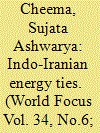

|
|
|
|
|
| Publication |
2013.
|
| Summary/Abstract |
Energy ties form the backbone of the Indo-Iranian relationship, underpinned by the concrete logic of supply and demand: Iran is anxious to sell its abundant hydrocarbon resources and India is an eager buyer. The complementary interests of India and Iran in the energy sector have been recognised by the Tehran and New Delhi Declarations, two substantive sets of agreements that spell out India-Iran cooperation on several issues. While the Tehran Declaration (2001) emphasized mutual benefits that would accrue from enhanced cooperation in the energy area, the New Delhi Declaration (2003) identified energy as a strategic area in the bilateral partnership. Since the Indo-US nuclear deal in 2005, New Delhi has been under intense pressure to align its stand with Washington on Tehran's nuclear programme as well as hold back on energy ties with the Islamic Republic. In fact, in the past few years, the US-led international economic sanctions against Iran have inhibited Indo-Iranian energy ties considerably.
|
|
|
|
|
|
|
|
|
|
|
|
|
|
|
|
| 7 |
ID:
188223
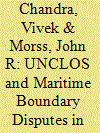

|
|
|
|
|
| Summary/Abstract |
The United Nations Convention on the Law of the Sea (UNCLOS) is credited for promoting order in the world’s oceans. This article evaluates UNCLOS in the context of maritime boundaries in areas of hydrocarbon potential. It uses a dataset of 109 maritime boundaries and finds that the most frequent maritime boundary resolution methodology was not a negotiated delimitation agreement, but a solution only indirectly referenced by UNCLOS: a Joint Development Area agreement with prescriptive resource sharing. This study also discovered that disputes that involve states that have chosen to opt out of compulsory dispute resolution procedures are more likely to remain unresolved than otherwise.
|
|
|
|
|
|
|
|
|
|
|
|
|
|
|
|